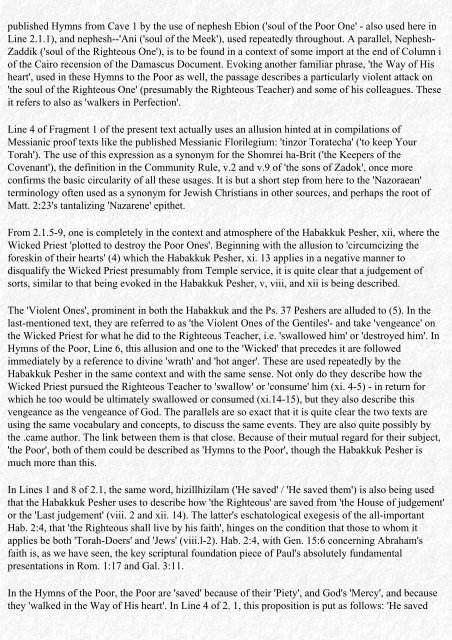Dead Sea Scrolls Uncovered - The Preterist Archive
Dead Sea Scrolls Uncovered - The Preterist Archive
Dead Sea Scrolls Uncovered - The Preterist Archive
You also want an ePaper? Increase the reach of your titles
YUMPU automatically turns print PDFs into web optimized ePapers that Google loves.
published Hymns from Cave 1 by the use of nephesh Ebion ('soul of the Poor One' - also used here in<br />
Line 2.1.1), and nephesh--'Ani ('soul of the Meek'), used repeatedly throughout. A parallel, Nephesh-<br />
Zaddik ('soul of the Righteous One'), is to be found in a context of some import at the end of Column i<br />
of the Cairo recension of the Damascus Document. Evoking another familiar phrase, 'the Way of His<br />
heart', used in these Hymns to the Poor as well, the passage describes a particularly violent attack on<br />
'the soul of the Righteous One' (presumably the Righteous Teacher) and some of his colleagues. <strong>The</strong>se<br />
it refers to also as 'walkers in Perfection'.<br />
Line 4 of Fragment 1 of the present text actually uses an allusion hinted at in compilations of<br />
Messianic proof texts like the published Messianic Florilegium: 'tinzor Toratecha' ('to keep Your<br />
Torah'). <strong>The</strong> use of this expression as a synonym for the Shomrei ha-Brit ('the Keepers of the<br />
Covenant'), the definition in the Community Rule, v.2 and v.9 of 'the sons of Zadok', once more<br />
confirms the basic circularity of all these usages. It is but a short step from here to the 'Nazoraean'<br />
terminology often used as a synonym for Jewish Christians in other sources, and perhaps the root of<br />
Matt. 2:23's tantalizing 'Nazarene' epithet.<br />
From 2.1.5-9, one is completely in the context and atmosphere of the Habakkuk Pesher, xii, where the<br />
Wicked Priest 'plotted to destroy the Poor Ones'. Beginning with the allusion to 'circumcizing the<br />
foreskin of their hearts' (4) which the Habakkuk Pesher, xi. 13 applies in a negative manner to<br />
disqualify the Wicked Priest presumably from Temple service, it is quite clear that a judgement of<br />
sorts, similar to that being evoked in the Habakkuk Pesher, v, viii, and xii is being described.<br />
<strong>The</strong> 'Violent Ones', prominent in both the Habakkuk and the Ps. 37 Peshers are alluded to (5). In the<br />
last-mentioned text, they are referred to as 'the Violent Ones of the Gentiles'- and take 'vengeance' on<br />
the Wicked Priest for what he did to the Righteous Teacher, i.e. 'swallowed him' or 'destroyed him'. In<br />
Hymns of the Poor, Line 6, this allusion and one to the 'Wicked' that precedes it are followed<br />
immediately by a reference to divine 'wrath' and 'hot anger'. <strong>The</strong>se are used repeatedly by the<br />
Habakkuk Pesher in the same context and with the same sense. Not only do they describe how the<br />
Wicked Priest pursued the Righteous Teacher to 'swallow' or 'consume' him (xi. 4-5) - in return for<br />
which he too would be ultimately swallowed or consumed (xi.14-15), but they also describe this<br />
vengeance as the vengeance of God. <strong>The</strong> parallels are so exact that it is quite clear the two texts are<br />
using the same vocabulary and concepts, to discuss the same events. <strong>The</strong>y are also quite possibly by<br />
the .came author. <strong>The</strong> link between them is that close. Because of their mutual regard for their subject,<br />
'the Poor', both of them could be described as 'Hymns to the Poor', though the Habakkuk Pesher is<br />
much more than this.<br />
In Lines 1 and 8 of 2.1, the same word, hizillhizilam ('He saved' / 'He saved them') is also being used<br />
that the Habakkuk Pesher uses to describe how 'the Righteous' are saved from 'the House of judgement'<br />
or the 'Last judgement' (viii. 2 and xii. 14). <strong>The</strong> latter's eschatological exegesis of the all-important<br />
Hab. 2:4, that 'the Righteous shall live by his faith', hinges on the condition that those to whom it<br />
applies be both 'Torah-Doers' and 'Jews' (viii.l-2). Hab. 2:4, with Gen. 15:6 concerning Abraham's<br />
faith is, as we have seen, the key scriptural foundation piece of Paul's absolutely fundamental<br />
presentations in Rom. 1:17 and Gal. 3:11.<br />
In the Hymns of the Poor, the Poor are 'saved' because of their 'Piety', and God's 'Mercy', and because<br />
they 'walked in the Way of His heart'. In Line 4 of 2. 1, this proposition is put as follows: 'He saved

















